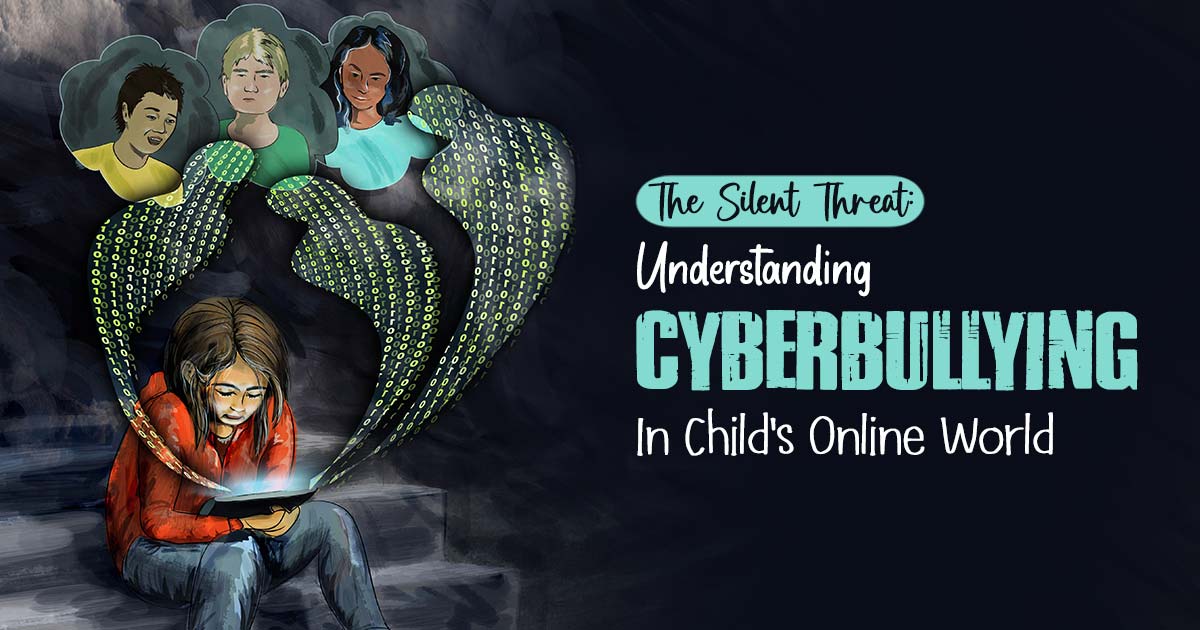In today’s increasingly digitized world, children are growing up with unprecedented access to technology and the internet. However, this convenience comes with a dark side: cyberbullying in children.
What Does Cyberbullying In Children Look Like?
Cyberbullying in children manifests in various forms, and recognizing these is crucial for parents, educators, and children themselves to address the issue effectively. It encompasses behaviors such as online threats, spreading malicious rumors, public shaming, and excluding others from online communities.
It is not limited to a single platform; instead, it proliferates across social media, instant messaging, email, and online gaming environments. In some cases, it takes more insidious forms through identity theft, impersonation, or the distribution of personal and explicit content without consent.
Anonymity on the internet often emboldens cyberbullies to engage in harmful behavior. It can be easier for individuals to target others when they believe their actions can be carried out without consequences. The lack of face-to-face interaction can lead to a sense of detachment from the victim’s feelings and experiences, making it even more challenging to empathize with the harm being inflicted.
How Can Cyberbullying Affect Children’s Mental Health?
The consequences of cyberbullying on children’s mental health can be severe and enduring. The constant exposure to online abuse and harassment can lead to feelings of fear, anxiety, depression, and a significant decrease in self-esteem.
The humiliation and social isolation that often accompany cyberbullying can push children into a state of despair, with some even contemplating self-harm or suicide as a means of escape. The emotional scars can last well into adulthood, affecting relationships, academic performance, and overall well-being.
Adolescents, in particular, are susceptible to the psychological impact of cyberbullying. This critical developmental stage is marked by heightened sensitivity to peer validation and a desire to fit in. When these desires are thwarted by cyberbullying, it can have profound psychological ramifications. Adolescents may be especially prone to internalizing the negative messages conveyed through online harassment.
Helping Children Who Have Been Cyberbullied
Recognizing that a child has fallen victim to cyberbullying is the first step in providing support. Signs of cyberbullying may include changes in behavior, such as withdrawal, excessive screen time, reluctance to attend school, or a sudden decline in academic performance. Open communication with children is essential, creating a safe space where they feel comfortable sharing their experiences.
Children should be encouraged to report instances of cyberbullying to parents, teachers, or school authorities. It is essential to document the abusive content or messages, as these can serve as evidence in any subsequent investigations or interventions. Reporting the incidents to the platform administrators, who may be able to take action against the cyberbully, is also crucial.
Emotional support is vital for children who have been cyberbullied. Parents, caregivers, and educators should offer a listening ear and reassurance that they are not alone in this struggle. Professional help from counselors or therapists may be necessary in severe cases to help children cope with the emotional trauma and develop effective strategies to rebuild self-esteem.
How To Stop Cyberbullying In Children: Tips And Strategies
Measures on how to stop cyberbullying prevention begin with raising awareness of the issue. Parents, educators, and children themselves should be informed about the risks of cyberbullying, its consequences, and strategies for prevention and intervention. School programs and community initiatives can play a significant role in educating everyone about the importance of digital respect and empathy.
Digital literacy, including media literacy and critical thinking, is a powerful tool in preventing cyberbullying. Teaching children to evaluate online content critically, fact-check information, and identify malicious behavior can help them protect themselves and others. It is crucial to educate children about responsible online behavior and the potential consequences of their actions.
Parents play a crucial role in preventing cyberbullying. They should be actively involved in their children’s digital lives, maintaining open lines of communication. Setting rules and boundaries for internet and social media usage can help protect children from potential harm. Monitoring online activities, especially for younger children, can be a proactive step to prevent cyberbullying.
Schools should have clear policies in place to address cyberbullying. These policies can include reporting mechanisms, consequences for cyberbullies, and support systems for victims. Implementing educational programs that focus on digital citizenship and the responsible use of technology can create a safer online environment for students.
Bystanders can play a crucial role in stopping cyberbullying. Encouraging and empowering witnesses to report incidents and support the victim can significantly impact the prevalence of online harassment. These bystanders can be taught to intervene and stand up against bullying in a safe and supportive manner.




























